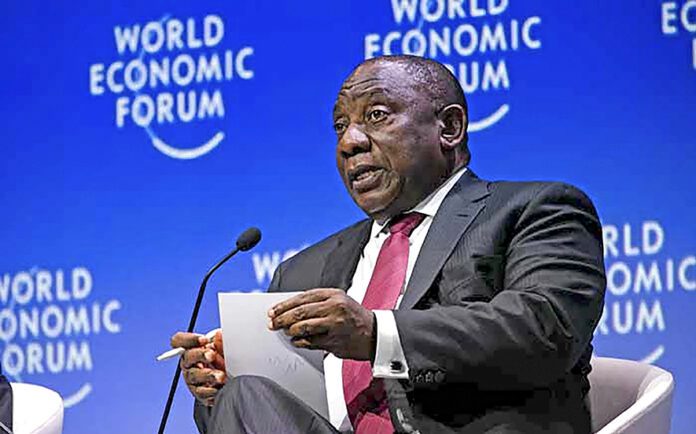By Bonang Mohale
Now that the president has finally filled cabinet vacancies precipitated largely by the outcome of ANC’s policy (not just elective) conference in 2022, we should pause and reflect whether we have succeeded in sending a strategic message that simply says South Africa is open for business and we will address all the self-created and own goals that have plunged the country into the current existential crisis
That we have demonstrated beyond any doubt that we are now better prepared to put our shoulders to the wheel and together create a sustainable country in the short term while building a more resilient country in the long term.
A South Africa that is globally competitive; can better leverage the natural resources window of opportunity; expand both rural and urban economies and markets through public-private partnerships; willing and able to focus on both productivity and growth; invest in growing our own timber and talent; grow more and larger black businesses and create more African champions; fully embrace digital across all areas of the economy; lead in implementing the Africa Continental Free Trade Agreement; step up regional tourism, collaboration, flows and investment and aggressively drive green business opportunities with pace, scale, size, scope and urgency.
More critical, have we put in place the type of leadership required? Leadership that not only promises to uphold, protect and respect the supremacy of the constitution, but demonstrates this in deeds, puts the interests of the country above the party’s; is pro-labour, pro-business and pro-poor.
A leadership that is serious about reshaping the country; actively seeks new and more opportunities; demonstrates a heightened sense of urgency; uses hindsight to gain insights that will better inform foresight to commitment to execution.
A leadership that is able to totally eradicate gangsters in the Cape Flats and Westbury to reverse the current trajectory where South Africa is ranked number 46 out of 163 with a score of 2 283 most violent countries in the world; Pretoria ranked first in the crime index among African cities with a rating of roughly 82 index points.
The latest crime statistics have revealed that KwaZulu-Natal is the country’s most deadly province followed by the Western Cape and Gauteng. Inanda in KwaZulu-Natal ranks as the most violent area with 99 murders.
South Africa continues to hold the world record for all the wrong reasons with the highest levels of inequality, unemployment, SME failure rate, femicide (five times the global average), lowest educational outcomes, and the second-highest suicide rate after Russia.
The much-anticipated greylisting by the Financial Action Task Force (FATF) has just exacerbated an already catastrophic situation.
The most significant implication to a country that is greylisted is the reputational damage, as its effectiveness in combatting financial crimes like corruption and money-laundering, as well as terror-financing are deemed to be below international standards.
That means a country’s shortcomings threaten the international financial system.
Such a country is subjected to increased monitoring and has to deal with adverse economic consequences for trade and transactions with other countries. Greylisted countries find it hard to obtain additional financing from the IMF and other lending institutions.
They suffer international boycotts from other countries. The economy goes for a toss with severe problems that come with greylisting, such as currency degrading, inflation, and deficit in trade, and less capital flows into South Africa.
According to the IMF, greylisted countries typically suffer an average net loss of 7.68% of capital flows into their states relative to gross domestic product.
As of March 2022, there were 23 countries on the FATF’s increased monitoring list – officially referred to as “jurisdictions with strategic deficiencies”. They include Pakistan, Syria, Turkey, Myanmar, Philippines, South Sudan, Uganda and Yemen.
The Edelman Trust Barometer 2023 has just released its latest report that focuses on “navigating a polarised world” and highlights four forces that lead to polarisation: economic anxieties (economic optimism is collapsing around the world, with 24 of 28 countries seeing all-time lows in the number of people who think their families will be better off in five years); institutional imbalance (business is now the sole institution seen as competent and ethical and government is viewed as unethical and incompetent; business is under pressure to step into the void left by government); mass-class divide (people in the top quartile of income live in a different trust reality than those in the bottom quartile, with massive gaps in Thailand, the US and Saudi Arabia) and the battle for truth (a shared media environment has given way to echo chambers, making it harder to collaboratively solve problems. The media are not trusted, with especially low trust in social media).
Many people face economic fears without a trust safety net. They see social fabric continuing to weaken.
Distrust breeds polarisation and polarisation worsens fears.
The citizens, employees and consumers are exerting more pressure on business to stand up for them and demand more societal engagement from business.
Business leaders and CEOs should speak out on social and ethical issues of the day and act on employees’ issues, discrimination, and climate change – invest in fair compensation, local communities, and skills training.
They should also use the power of brands to create a shared identity and hold divisive forces finally accountable. Best societal outcomes are envisaged when business and government work together.
• Mohale is the president of Business Unity South Africa, chancellor of the University of the Free State, Professor of Practice in the Johannesburg Business School College of Business and Economics, and chairman of the Bidvest Group Limited. He is also the author of best-selling books Lift As You Rise and Behold The Turtle
Follow @SundayWorldZA on Twitter and @sundayworldza on Instagram, or like our Facebook Page, Sunday World, by clicking here for the latest breaking news in South Africa. To Subscribe to Sunday World, click here.



